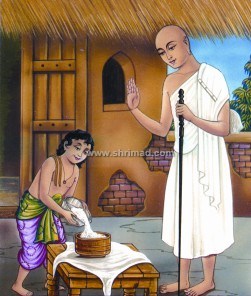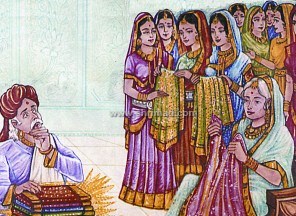Shalibhadra
Once there lived a poor woman and her son in a small village. One day, there was a festival in the village and all the kids, including the poor boy, were playing together. After playing, all except the poor boy, started to eat Kheer (rice pudding) that they had brought with them. The poor boy did not have Kheer to eat. He felt bad and ran home to his mother. He asked her if she would make some Kheer for him since all other children were eating it. His mother said that she could not make Kheer and told him to eat whatever she had cooked. He started crying and insisted on having Kheer. His mother could not bear to see him cry. Therefore, she went to a neighbor’s house and borrowed some milk, sugar, and rice, and made Kheer for her son. She poured the Kheer into a dish and left to bring some water from the well.
As the boy was about to start eating, he heard the words, “Dharma Läbha” (meaning, may you be blessed with spirituality, usually spoken by Jain Sädhus and Sädhvis when they arrive at a lay person’s house for Gochari - food). He saw a Jain Sädhu at the door. Without hesitation, the hungry boy invited the monk in and offered him the Kheer. He poured all the Kheer from his plate into the monk’s container. He was happy that he could offer this to the monk even though nothing was left for him to eat. His good intentions and his pious action helped him earn good Karmas.

The boy is happily offering Kheer to the monk
In his next life he was born as Shälibhadra in a very rich family. His life was like being in heaven. His parents were Bhadrä Shethäni and Gobhadra Sheth. His father had renounced the world to become a monk when Shälibhadra was a young boy. His mother provided him all the comforts and luxury and never let him out of the palace for fear that he might become a monk like his father. It was said that even the heavenly beings were jealous of his lavish lifestyle. When he grew up, he was married to 32 beautiful women.
One day, some merchants from Nepal came to town to sell some very exquisite diamond studded shawls. They went to King Shrenik’s court where the king told them that he could not afford to buy such expensive shawls. The merchants returned from court in utter disappointment because they were hoping to sell some shawls to the king. The merchants also thought that since the king could not afford to buy any then none of his people would have enough wealth to buy their shawls in this city and decided to leave town.
When Bhadrä Shethäni heard this, she sent a messenger and requested the merchants to visit her. The merchants were reluctant to go because if the king could not buy a shawl, how could any of the residents buy such expensive shawls! When they reached the house, Bhadrä Shethäni asked, “How many shawls do you have?” They said they had sixteen shawls. She said, “Only sixteen? I need thirty-two shawls because I have thirty-two daughters-in-law.” The merchants thought she was joking believing that she would not even buy one. She said, “Please take out those shawls.” They took out the sixteen shawls. The merchants were surprised that without a second thought she bought all sixteen shawls. They were further astounded to see her tearing such precious shawls into two pieces in front of them and giving a piece to each of her daughters-in-law to wipe their feet. The merchants were stunned but left with joy. The daughters-in-law used the pieces once and threw them away.

Bhadra Shethäni buying very expensive shawls for her daughters-in-law
One of the servants at Shälibhadra’s palace knew the queen so she took a piece of shawl for the queen. The queen was baffled but happy that such rich people lived in her kingdom. She told King Shrenik about the shawls and he was also very proud of such rich people upholding the good name of his kingdom. He invited Shälibhadra to his court to honor him. When Bhadrä Shethäni found out, she went to the king and told him that her son was very shy, and invited the king to come to their palace. King Shrenik accepted the invitation and went to Shälibhadra’s palace. When King Shrenik reached there, he realized that his own palace was nothing compared to Shälibhadra’s palace. Bhadrä Shethäni offered him a place to sit and asked Shälibhadra to come down to honor and respect the king.
Shälibhadra did not know anything about the king or his kingdom and thought that there was some sort of merchandise that his mother wanted to show him. So he said, “I do not want to see it but you go ahead and buy it.” His mother said, “This is not merchandise. He is our king, our master, and you need to come down to greet and honor him.” The word “master” started ringing in his ears. He wondered, “Why should I have a master over me? I should be the master of myself.” While thinking like this, he came down and paid his respect to the king, but he did not stay very long.
He kept thinking that he was not a free person because there was someone like a king and master over him. He started to think about his father (who had become a monk) and the real meaning of life. He decided at that very moment to become a monk and told his family about his decision. His mother and all his wives tried to convince him to spend some more time with them. However, he was determined to renounce the world. Instead of renouncing all his possessions and family members at once, he agreed to spend one day with each of his wives and at the end of thirty-two days he would become a monk. He started to do that the very same day.
Shälibhadra had a sister named Subhadrä. She was married to Dhannä. Dhannä had eight wives. One day Subhadrä was giving her husband Dhannä a bath and suddenly tears rolled down her face and fell on him. He asked her why she was crying. She told him that her brother had decided to become a monk and that he had been spending one day with each of his wives and at the end of 32 days he will become a monk. Dhannä laughed and told Subhadrä, “Your brother is a coward. If he wants to become a monk, then why wait for 32 days?” Subhadrä was upset to hear that, and told her husband, “It is easier said than done.” This sparked awareness in Dhannä’s mind and he told her, “I am leaving all eight of you right now to become a monk.” Subhadrä was taken by surprise. She thought that her husband was joking. However, Dhannä said, “It is too late now. I am determined to become a monk. If you all want to join me, you are welcome.” Seeing Dhannä’s determination, Subhadrä and his seven wives decided to become nuns.
Dhannä then went to his brother-in-law Shälibhadra’s palace and challenged him, “Hey Shälibhadra! If you really want to leave your family and possessions, then what are you waiting for? Join me.”
Shälibhadra heard him and accepted the challenge. He told his wives and other family members, “I am leaving you all today.” He went down to join his brother-in-law. His wives joined him too. All of them went to Lord Mahävir, accepted Dikshä and became monks and nuns. After observing severe penances as monks, Dhannä and Shälibhadra were born as heavenly beings in heaven. From there, they will be born again as human beings and attain liberation.
Selfless service always pays off. Neighbors helping neighbors reflects a caring society. The virtue of a charitable act in the life of a little boy was rewarded multiple times in the life of Shälibhadra. As a result, he was able to leave everything easily. Good deeds always leave an imprint on the soul. Good deeds and practicing penance ultimately leads to the liberation of the soul.